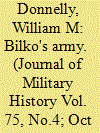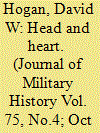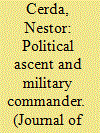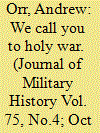|
|
|
Sort Order |
|
|
|
Items / Page
|
|
|
|
|
|
|
| Srl | Item |
| 1 |
ID:
116800


|
|
|
|
|
| Publication |
2011.
|
| Summary/Abstract |
A major criticism of the U.S. Army during the Vietnam War is that it suffered from a crisis in command, especially among officers above the company grade level. Most writing on this topic has centered on structural issues, such as post-World War II personnel policies. This article will examine this phenomenon between the Korean and Vietnam wars by comparing contemporary publications and retrospective critiques by veterans with internal Army sources, particularly service schools, the headquarters of the Continental Army Command, and Headquarters, Department of the Army. If a crisis in command existed between 1953 and 1965, did these organizations' leaders recognize it and address it?
|
|
|
|
|
|
|
|
|
|
|
|
|
|
|
|
| 2 |
ID:
116799


|
|
|
|
|
| Publication |
2011.
|
| Summary/Abstract |
This article identifies a significant hole in the literature of World War II. Few works discuss the everyday life of medical personnel and fewer still detail the lives of naval medical providers; those that do tend to focus on the exciting and bloody aspects of a medico at war. Filling this gap, this article argues that the most accurate picture of life at war should include life's routine features and then describes the everyday experiences of a U.S. Navy doctor in the Pacific from September 1944 to December 1945, whose daily existence was far different from and more typical than the one most often portrayed.
|
|
|
|
|
|
|
|
|
|
|
|
|
|
|
|
| 3 |
ID:
116793


|
|
|
|
|
| Publication |
2011.
|
| Summary/Abstract |
In recent years, Afghanistan and Iraq have drawn new attention to an old subject: American attitudes toward warfare. This essay surveys the existing literature to approach this problem through the interlocking factors of reason and feeling. At first, Americans reconciled these factors, and justified their wars, because republicanism, romantic nationalism, and Victorian culture created the comforting sense of a chosen nation in an orderly, moral cosmos. When two world wars and the Great Depression produced modernist doubt, Americans used nationalism, pragmatism, and faith in technology to guide and sustain them. By the late twentieth century, however, modernist challenges to old universals in a larger and more pluralistic society became harder to reconcile as debates over wars polarized along emotional extremes, while reason's proponents clung to a precarious middle ground. Currently, the prospect of a revived consensus appears remote.
|
|
|
|
|
|
|
|
|
|
|
|
|
|
|
|
| 4 |
ID:
116794


|
|
|
|
|
| Publication |
2012.
|
| Summary/Abstract |
During World Wars I and II German women's service became increasingly important for the functioning of the home front as well as the battle front. In 1944-45 more than 500,000 women were auxiliaries in the German armed forces (Wehrmacht), the same number served in civil aerial defense, 400,000 volunteered as nurses, and many more replaced drafted men in the wartime economy. This article takes a closer look at German women's wartime service in the age of the two world wars in history, historiography, and memory, and tries to explain the paradox that while women's wartime service was needed, it has long been overlooked in post-war memory and mainstream historiography. The essay draws upon recent scholarship, earlier publications, and primary sources to provide a comprehensive English-language overview.
|
|
|
|
|
|
|
|
|
|
|
|
|
|
|
|
| 5 |
ID:
116798


|
|
|
|
|
| Publication |
2011.
|
| Summary/Abstract |
On 17 July 1936 a military coup against the leftist Popular Front government in Spain began with a military uprising in Spanish Morocco, marking the start of the lethal three-year Spanish Civil War. Unforeseen setbacks to the military leaders' plans in July and August 1936 radically altered the strategic situation, and gave Major General Francisco Franco a unique opportunity. This essay seeks to understand how he used that opportunity, rising from being merely another general supporting the uprising in July to the position of commander-in-chief of the Nationalist army and head of government less than three months later.
|
|
|
|
|
|
|
|
|
|
|
|
|
|
|
|
| 6 |
ID:
116796


|
|
|
|
|
| Publication |
2011.
|
| Summary/Abstract |
In the immediate aftermath of the First World War, Mustafa Kemal and his Turkish National Movement fought to create a Turkish nation-state in the face of Allied attempts to partition the Turkish regions of the former Ottoman Empire. The struggle over the future of Turkey overlapped with the civil war which came on the heels of the Bolshevik Revolution in neighboring Russia and the assumption of control over nearby parts of the Middle East by Britain and France. Believing that events in Turkey were bound to have an impact on its attempt to consolidate control over its new imperial holdings in the Near East, the French government made a concerted effort to come to grips with the nature of the Kemalist movement. In the process, however, France's military intelligence analysts, instead of seeing Kemalism as the nationalist and secular, westernizing movement it was, chose to identify Kemal as the central figure in a communist-inspired, German-controlled anti-colonial enterprise closely allied to Islamist political movements. The French military's misunderstanding of Kemal's goals and ideology reflected intelligence officers' belief that Middle Eastern developments were essentially derivative of European politics.
|
|
|
|
|
|
|
|
|
|
|
|
|
|
|
|
|
|
|
|
|